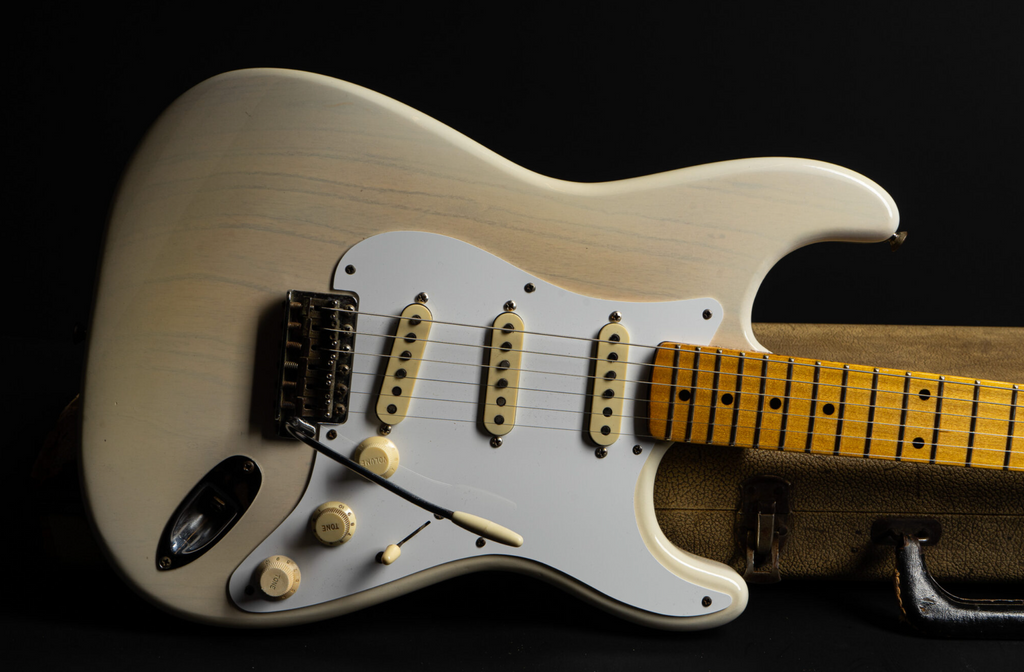Do Vintage Guitars Really Appreciate in Value?

Truth, Myth & Market Reality
If you’ve ever held a pristine 1950s Fender Stratocaster or gently strummed an early ’70s Gibson, it’s natural to wonder
“Is this guitar actually a good investment?”
It’s an appealing thought—guitars hold emotional and artistic value and offer a tangible presence that stocks or bonds simply can't match. But let's take a careful look at the facts and figures to reveal the nuanced truth about vintage guitars as investments.
Comparing Investments: 1993 to 2025
Imagine it's 1993 and you have £3,000 to invest. Here’s how different investments would look in 2025:
| Investment | Value in 2025 | Notes |
|---|---|---|
| Pre-CBS Fender Stratocaster (late ’50s, mint condition) | £30,000–£40,000+ | Premium collector condition |
| Gold | £33,600 | From approx. £230/oz (1993) to £2,448/oz (2025) |
| Silver | £9,000 | Steady, slower growth with higher volatility |
| S&P 500 Index (with dividends) | £75,000 | Broad market performance |
| Apple Stock | £1.5 million+ | Exceptional growth |
Clearly, select vintage guitars can indeed appreciate significantly. While vintage guitars rarely outperform exceptional stocks like Apple, they consistently outperform precious metals such as silver and closely match gold’s impressive returns.
Why Vintage Guitars Became Valuable
The true value of vintage guitars took shape in the late ’80s and early ’90s. At this time, manufacturing standards declined at major brands like Fender and Gibson, prompting musicians and enthusiasts to seek guitars from the "Golden Era" (1950s and early 1960s) for their superior craftsmanship, playability, and tone.
As interest grew, these instruments evolved from being mere guitars to treasured cultural artefacts.
Condition is Everything
The value of vintage guitars is highly dependent on their originality and condition. Consider these examples:
-
A 1960 Fender Stratocaster completely original with rare custom colour, original tags, case, and minimal wear: £30,000–£40,000
-
A similar guitar but refinished with replacement parts, no original case, and significant modifications: £9,000–£12,000
Collectors value originality above all. Even small changes like refinishing or replacement parts can dramatically reduce a guitar’s worth.
Brand and Model is Key
While brands like Fender and Gibson have seen some huge gains in some of their vintage models in the last three decades there have been other brands and models that simply never attracted market attention and have barely kept up with inflation. Simply being 'vintage' isn't enough. If you were stashing Gibson Melody makers under the bed hoping they would one day be worth a fortune then you'll sadly be looking at very modest returns.
Important Note:
Achieving the highest valuations typically requires selling through a reputable dealer with an extensive network and established trust. Private sellers often struggle to reach similar values unless offering exceptional provenance (e.g., original owner, proof of purchase, photographs).
Liquidity & Selling Challenges
Unlike traditional investments such as gold or stocks, vintage guitars can’t be liquidated instantly. Selling a valuable guitar involves:
-
Professional photography
-
Detailed descriptions
-
Extensive buyer communication
-
Negotiations
-
Secure shipping and insurance
While gold can easily be converted into cash, vintage guitars often require considerable time and effort to sell, especially if you're selling privately.
The Future of Vintage Guitar Values
The vintage guitar market is now at a crossroads. Baby boomers—who significantly drove the market upwards—are aging and selling their collections, potentially creating an oversupply. Younger generations' shifting preferences towards digital gear and modern instruments might dampen future demand.
However, the guitars most likely to retain value are:
-
Original, collector-grade examples with impeccable provenance
-
Rare finishes and historically significant models
-
Instruments sold through reputable dealers guaranteeing authenticity
Modified, "player-grade" guitars could face declining prices as market supply potentially surpasses demand.
Final Reflections
So, are vintage guitars good investments?
Absolutely, but with caveats:
-
They are often difficult to liquidate quickly.
-
Condition and originality heavily influence value.
-
Market shifts and generational trends may impact future appreciation.
Ultimately, buying a vintage guitar should be about passion first and investment second. If it appreciates, fantastic. If it doesn’t, you still own something uniquely enriching—after all, you can’t play a gold bar or jam with a stock portfolio!
Thinking of buying or selling a vintage guitar?
If you’d appreciate an honest and knowledgeable valuation based on current market conditions, don’t hesitate to get in touch.








